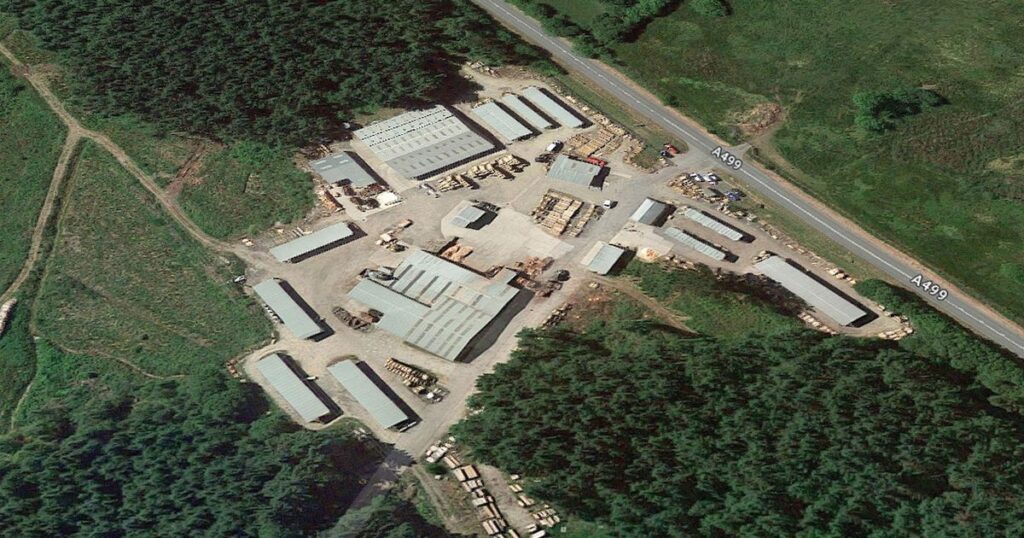Following consultations with the Williams-Ellis family, Glasfryn Fencing, a sustainable forestry operation, is set to cease operations, impacting the local community. This decision marks the end of a long-standing contributor to the North Wales forestry industry.
Founded 37 years ago by the nephew of Sir Clough Williams-Ellis, the company has been a significant fixture in the region’s economy, known for its quality products and commitment to sustainability.
Decision to Close
Glasfryn Fencing, based in Gwynedd, will be closing its doors after nearly four decades of operation. This decision was made by Glasfryn estate trustees in consultation with the Williams-Ellis family. Site manager Arwel Roberts, an integral part of the company since its inception, expressed his disappointment regarding the closure.
The workforce, consisting of nine individuals, was informed about the decision. This includes a dedicated employee who has been with the company for 34 years. The closure has led to significant disruptions in the area, particularly with a surge in order cancellations.
Impact on Local Orders and Christmas Preparations
Mr Roberts noted the difficulty of the timing, stating, “December 22 would have been a better date to finish. We’ve got a lot of orders for Christmas trees, and we’ve been busy on the phones having to cancel them all. It’s heart-breaking.” With approximately 8,500 tree orders cancelled, the future of the harvested woodlands is uncertain.
Glasfryn Fencing had built a reputation for its high-quality products, which often outlasted those of its competitors. The company’s recent focus included becoming a significant provider of firewood. This move was part of a broader strategy to diversify its offerings and increase its market presence.
Historical Significance and Business Evolution
The business was initially established by Roger Williams-Ellis, who passed away in 2018 at the age of 94, to commercialise timber from his woodlands.
During the 1970s, Glasfryn traded two to three million trees annually. However, a decline in softwood prices led to the introduction of a sawmill in the 1980s, a rare feature among Welsh woodland operations.
The sawmill provided the estate with control over its production line, enhancing its capacity to guarantee product quality. Mr Roberts recalled the humble beginnings, working with minimal machinery and gradually earning the trust of local farmers.
Infrastructure and Technological Advancements
As the business grew, Glasfryn Fencing benefited from electrification and grant funding, which included a £250,000 mill with advanced facilities.
These modernizations included a timber drying shed and a tanalising plant to protect wood products from rot and insects. Initially, firewood production was basic, using chainsaws and axes, but it was later enhanced with a tractor-mounted log splitter.
Even previously worthless tree sections were sold to Anglesey Aluminium plant, demonstrating the company’s commitment to waste reduction and resourcefulness. Innovations continued, with the development of products like flagpoles, picnic tables, and repurposing of bark and sawdust.
Community and Regional Influence
Mr Roberts highlighted the company’s role in supplying Christmas trees to Pen Llyn households and larger clients like hotels and councils, enhancing festive celebrations.
He lamented, “It’s a very sad story. We have customers across the region, from Anglesey to Llanrwst, Abergele, and Bala. The furthest is in Powys, and we’re trying to let all of them know what’s happening.”
The skilled workforce, trained on-site, are unlikely to find suitable employment locally. Their expertise, honed over the years, will no longer be in demand without the sawmill’s operations.
Stakeholder Reactions and the Future
The trustees and the Williams-Ellis family, who made the closure decision, did so after much deliberation. Mr Roberts acknowledged their position while expressing regret for the employees and the larger community affected by this development.
The business’s closure leaves a gap in the local economy, particularly as Glasfryn Fencing was known for its sustainability and quality. The end of such an institution entails significant regional repercussions and a loss of heritage.
Legacy and Lessons
Despite the closure, the legacy of Glasfryn Fencing as a pioneer in the sustainable forestry sector remains intact. Their commitment to quality and innovation set a benchmark for similar enterprises.
The story of Glasfryn Fencing underscores the importance of adaptability and community support in the success of local businesses, leaving behind valuable lessons for future ventures in the region.
The closure of Glasfryn Fencing marks the end of an era in North Wales’ forestry industry. The company’s dedication to quality and sustainability will be remembered fondly by the community.
Although operations will cease, the principles and innovations that defined Glasfryn will continue to influence the local forestry sector and serve as a model for sustainable practices.


